
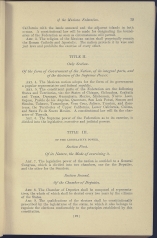
OF THE LEGISLATIVE POWER.
Of its Nature, the Mode of exercising it.
Article 7. The legislative power of the nation is confided to a General Congress, which is divided into two chambers, one for the Deputies, and the other for the Senators.
Of the Chamber of Deputies.
Article 8. The Chamber of Deputies shall be composed of representatives, the whole of which shall be elected every two years by the citizens of the States.
Article 9. The qualifications of the electors shall be constitutionally prescribed by the legislatures of the states, to which it also belongs to regulate the elections conformably to the principles established by this constitution.
Article 10. The general basis for the appointment of deputies shall be the population.
Article 11. A deputy shall be elected for every eighty-thousand inhabitants and for every fraction exceeding forty thousand. Any state, which may not have so large a population is nevertheless entitled to one deputy.
Article 12. A census of the whole confederation shall be taken within five years, and shall be renewed afterwards every ten years, which shall serve to designate the number of deputies to which each state is entitled. In the meantime the elections are to be regulated on the basis established in the preceding article, and the census which served to regulate the election of deputies in the congress now in session.
Article 13. There shall also be elected in every state deputies substitutes in proportion of one for every three deputies or one for every fraction of two. States having less than three deputies will elect one substitute.
Article 14. Every territory containing more than fifty thousand inhabitants, shall name one deputy and one substitute, who shall have voice and vote in the formation of all laws and decrees.
Article 15. A territory not possessing the aforesaid population, shall name a deputy and a substitute, who shall have the right to speak on all subjects. The elections of the deputies from the different territories shall be regulated by a special law.
Article 16. In all the states and territories of the Federation, the appointment of the deputies shall take place the first Sunday in the month of October next preceding the renovation, which is an indirect election.
Article 17. As soon as the election of deputies is concluded, the electoral boards shall, through their president, forward to the council of the government evidence, in due form, of the act of election, and duly certified, and they shall notify to the persons appointed in their election, which shall serve as their credentials.
Article 18. The president of the council of the government shall give to this evidence, spoken of in the preceding article, that direction which is prescribed by the regulations of said council.
Article 19. In order to be appointed deputy it is necessary:
1st. To have, at the time of election, full twenty-five years.
2d. To have resided in the state from which elected full two years, or to be born in it, though residing in a different state.
Article 20. Those not born in the territory of the Mexican nation, must, in order to be elected deputies, have resided at least eight years within the same, and possess real estate in some part of the republic worth eight thousand dollars, or some species of industry making them an income of one thousand dollars annually.
Article 21. Are excepted from the operation of the preceding article:
1st. All those born in any part of America, which, in 1810, depended on Spain, and which has not united with any other nation, and which no longer remains dependent on Spain, for whom three years residence will suffice, provided they have the other requisites prescribed by the 19th article.
2d. All military men not born in the territory of the Republic, but who have supported with arms the independence of the country, for whom it shall be sufficient to have resided eight years in the country and to possess the qualifications required by article 19.
Article 22. The election of deputies on account of residence shall be preferred to that made on account of birth.
Article 23. The following cannot be deputies, viz:
1st. Those deprived of, or suspended from, the rights of citizens.
2d. The president and vice president of the Union.
3d. The members of the supreme court of justice.
4th. The secretaries of the different departments, their officers and secretaries.
5th. The officers of the treasury, whose employments extend throughout the Union.
6th. The governors of the states and territories, the commandant generals, the right reverend archbishops and bishops, the governors of the archbishops and bishops, the provisor and vicar generals, the circuit judges, and the commissary generals of war and finance for the states and territories in which they exercise their functions.
Article 24. In order that the persons comprehended in the preceding article may be elected deputies, it is necessary that their functions should have entirely ceased six months previous to the elections.
(Transcription, errors in original preserved)
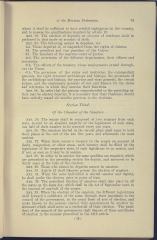
Of the Chamber of the Senators.
Article 25. The senate shall be composed of two senators from each state, elected by an absolute majority of the legislature of each state, one half of their number to be renewed every two years.
Article 26. The senators elected in the second place shall cease to hold their places at the end of the two first years, and afterwards the most ancient.
Article 27. When there occurs a vacancy in the senate on account of death, resignation, or other cause, such vacancy shall be filled by the legislature of the respective state, if such legislature be in session, and if not, as soon as it may be in session.
Article 28. In order to be senator the same qualities are required, which are prescribed in the preceding section for deputy, and moreover to be thirty years at the time of the election.
Article 29. Those who cannot be deputies cannot be senators.
Article 30. Article 22 shall likewise govern the election of senators.
Article 31. When the same individual is elected senator and deputy, he shall prefer the election prior in point of time.
Article 32. The periodical election of senators shall take place in all the states on the same day, which shall be the 1st of September next, to the renewal of one-half of the senate.
Article 33. When the election of senators concludes, the different legislatures shall forward a certificate of the same, through their presidents to the council of government, in the usual form of acts of election, and make known to the persons elected their appointment by another instrument which shall serve as a credential of their election. The president of the council of government shall dispose of these certificates of election in the manner prescribed in the 18th article.
(Transcription, errors in original preserved)
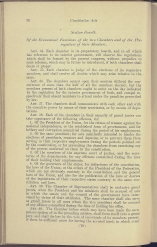
Of the Economical Functions of the two Chambers and of the Prerogatives of their Members.
Article 34. Each chamber in its preparatory boards, and in all which has reference to its interior government, will observe the regulations which shall be formed by the present congress, without prejudice to such reforms, which may in future be introduced, if both chambers shall deem it proper.
Article 35. Each chamber is judge of the elections of its respective members, and shall resolve all doubts which may arise relative to the same.
Article 36. The chambers cannot open their sessions without the concurrence of more than half of all the members elected; but the members present of both chambers ought to unite on the day indicated by regulation for the interior government of both, and compel respectively their absent members to attend under the penalties prescribed by law.
Article 37. The chambers shall communicate with each other and with the executive power by means of their secretaries, or by means of deputations.
Article 38. Each of the chambers in their capacity of grand jurors can take cognisance of the following offences, viz:
1st. Of the President of the Union, for the crimes of treason against the national independence, or the established form government, and for bribery and corruption committed during the period of his employment.
2d. Of the same president; for acts manifestly intended to hinder the elections of presidents, senators and deputies, or to prevent them from serving in their respective employments during the periods pointed out by the constitution, or for preventing the chambers from exercising any of the powers conferred on them by the constitution.
3d. Of the members of the supreme court of justice, and the secretaries of the departments; for any offences committed during the time of their holding their employments.
4th. Of the governors of the states; for infractions of the constitution, the laws of the Union, or the orders of the President of the Federation, which are not obviously contrary to the constitution and the general laws of the Union, and also for the publication of laws or decrees of the legislatures of their respective states contrary to the same constitution and laws.
Article 39. The Chamber of Representatives shall be exclusive grand jurors, when the President and his ministers shall be accused of acts in which the senate and the council of government have intervened by virtue of their attributes. The same chamber shall also serve as grand jurors in all cases where the vice president shall be accused of any offence committed during the time of holding his office.
Article 40. The Chamber before which may have been made the accusations spoken of in the preceding articles, shall form itself into a grand jury, and shall declare by vote of two-thirds of its members present, if there be sufficient cause for having the accused tried, in which event he shall be suspended from office, and the cause sent to the competent tribunal.
Article 41. Every deputy and senator has the right of presenting in writing propositions and projects of laws or decrees in his respective Chamber.
Article 42. The deputies and senators are not responsible for any opinions which they may express in the discharge of their employments, and they can never be called to account for the same.
Article 43. In criminal prosecutions brought against the senators or deputies from the day of their election, until two months after they shall have discharged their functions, the former cannot be accused except before the Chamber of Deputies, and the latter, except before the Senate, and in the event of similar accusations the Chamber shall form itself into a grand jury, for the purpose of determining if there be any foundation for such accusation.
Article 44. If the Chamber, constituting the grand jury in the cases mentioned in the preceding article, should declare by the vote of two-thirds of the members present, that the accusation is well founded; the accused remains suspended from his employment, and placed at the disposal of the competent tribunal.
Article 45. The compensation of the deputies and senators shall be determined by law, and be paid by the General Treasury of the Confederation.
Article 46. Each Chamber as well as the boards spoken of in the 36 art., may issue such orders as it deems convenient, in order to carry into effect any resolutions adopted by virtue of the function, delegated to each by virtue of articles 35, 36, 39, 40, 44 and 45 of the constitution, and the President of the United States ought to cause them to be executed, without possessing the right of making any observations on their tenor.
(Transcription, errors in original preserved)
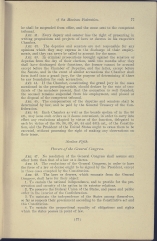
Powers of the General Congress.
Article 47. No resolution of the General Congress shall assume any other form than that of a law or a decree.
Article 48. The resolutions of the General Congress, in order to have the force of a law or decree ought to be signed by the President, except in those cases excepted by the Constitution.
Article 49. The laws or decrees, which emanate from the General Congress, shall have for their object:
1st. To sustain the national independence, and to provide for the preservation and security of the nation in its exterior relations.
2d. To preserve the Federal Union of the States, and peace and public order in the interior of the Confederation.
3d. To maintain the independence of the States among themselves, so far as respects their government according to the Constitutive act and this Constitution.
4th. To sustain the proportional equality of obligations and rights which the states possess in point of law.
Article 50. The exclusive powers possessed by the General Congress are the following, viz:
1st. To promote instruction by securing for a limited time to authors the exclusive privilege to their works; by establishing colleges for the Marine, Artillery and Engineer Departments; by erecting one or more establishments, for the teaching of the natural and exact sciences, the political and moral sciences, the useful arts and languages; without prejudice to the rights which the states possess, to regulate the public education in their respective states.
2d. To promote the general prosperity, by decreeing the opening of roads, canals, and their improvement without hindering the states from opening and improving their own; establishing post offices and post roads, and securing for a limited time to inventors, or those who have perfected, or introduced any new invention, the exclusive privilege for their respective invention, improvements or new introductions.
3d. To protect and regulate the political liberty of the press in such a manner that its exercise can never be suspended, and much less be abolished in any of the states or territories of the confederation.
4th. To admit new states and territories into the federal union, and to incorporate the same with the nation.
5th. To regulate definitively the boundaries of the states, and terminate the differences, when they cannot agree among themselves about the lines of demarcation of their respective districts.
6th. To erect territories into states and regulate them in conformity with those already existing.
7th. To unite two or more states, upon their petition to that effect, into one, or two erect new states within the limits of those already in existence, with the approbation of three-fourths of the members present in both chambers, and the ratification of an equal number of the legislatures of the other states of the Union.
8th. To fix the general expenses, establish the contributions necessary in order to defray them, to regulate their collection, determine their expenditure, and to require annually account of the same from the government.
9th. To contract debts on the credit of the confederation, and to fix the guarantees of their repayment.
10th. To acknowledge the national debt, and indicate the means to consolidate and extinguish the same.
11th. To regulate the commerce with foreign nations, between the different states of the Union and with Indian tribes.
12th. To give instructions for the forming of Concordates with the Holy See, to approve and ratify the same, and to regulate the exercise of patronage (patronato) in the whole Union.
13th. To approve treaties of peace, alliance, friendship, confederation, armed neutrality, and all others which the President of the United States may enter into with foreign powers.
14th. To establish ports of all kinds, erect custom-houses, and designate their location.
15th. To determine and render uniform the weight, fineness, value, stamp and denomination of the coins throughout the Union, and to adopt a general system of weights and measures.
16th. To declare war, upon examining the facts presented to its consideration by the President of the United States.
17th. To establish rules for the granting of letters of marque, and for declaring valid or invalid prizes on water and land.
18th. To designate the force of the army and navy, to fix the contingent of men to be furnished by each state, to establish ordinances and rules for their organization and service.
19th. To form regulations for the organization, arming and disciplining of the local militia of the states; reserving to each state the appointment of its own officers and the faculty of instructing them according to the discipline laid down in the aforesaid regulations.
20th. To grant or refuse the entrance of foreign troops into the territory of the confederation.
21st. To permit or to refuse to squadrons belonging to foreign powers to remain for more than one month in Mexican harbors.
22d. To permit the departure of national troops beyond the limits of the republic.
23d. To create or suppress all public employments of the Federation, to fix, increase or diminish the appointed salaries, rewards, in case of retirement, and pensions of the same.
24th. To grant rewards and compensations to persons who have rendered great services to the republic, and to decree public honors in memory of great men.
25th. To grant amnesties and indulgences for offenses the cognisance of which appertains to the tribunals of the confederation, in such cases, and upon observing the prerequisites prescribed by law.
26th. To establish a uniform rule of naturalization.
27th. To establish general rules as to bankruptcy throughout the Union.
28th. To select a place of residence for the supreme powers of the Federation and to exercise in its district the attributes of the legislative power of a state.
29th. To change such residence whenever it may deem it necessary.
30th. To grant laws and decrees for the interior administration of the Territories.
31st. To dictate all laws and decrees, which may conduce to accomplish the objects spoken of in the forty-ninth article without intermeddling with the interior administration of the states.
(Transcription, errors in original preserved)
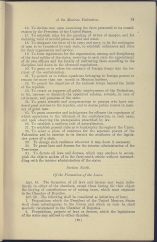
Of the Formation of the Laws.
Article 51. The formation of all laws and decrees may begin indistinctly in either of the chambers, except those having for their object the levying of contributions or of raising taxes, which must originate in the Chamber of Deputies.
Article 52. The following shall be considered as initiatives of laws:
1st. Propositions which the President of the United Mexican States shall deem advantageous to the Union and which as such he shall specially recommend to the Chamber of Deputies.
2d. Propositions, projects of laws or decrees, which the legislatures of the states may address to either chamber.
Article 53. All projects of laws or decrees without any exception whatever shall be successively discussed in the two chambers, observing in both with exactness what it prescribed in the regulations as to the form of debate, as well as to the delays and modes of proceeding in voting.
Article 54. Propositions of laws or decrees, which have been rejected in the chamber, where they originated, before the final reading cannot again be proposed by any member during the sessions of that year, nor until the ordinary sessions of the years following.
Article 55. If the propositions of laws or decrees after having been discussed be approved by an absolute majority of the members present in both chambers, they shall be sent to the president of the United States, who if he also approves shall sign and publish the same; and if not, shall return them with his observations within ten working days to the chamber whence they originated.
Article 56. The propositions of laws or decrees returned by the president, according to the preceding article, shall be a second time discussed in the two chambers. If in each of them, they be approved by two-thirds of the members present, they shall again be sent to the president, who without further excuse must sign and publish them; but if not approved by the votes of two-thirds of the members, they cannot again be proposed until the year following.
Article 57. If the president should not return a proposed law or decree within the period prescribed in the 55th article, it shall be considered as approved by that very fact, and be promulgated as law; unless while the delay is not yet expired, congress should have closed or suspended its sessions, in which event the return must be made on the first day thereafter when congress shall again unite.
Article 58. The projects of law or decrees once wholly rejected by the chamber of revision, shall be returned by said chamber to that in which it originated. If upon re-examination in the latter, it be approved by two-thirds of the members present, it shall be sent back again to the chamber by which it was rejected, who shall not again reject it, unless by the vote of two-thirds of the members present.
Article 59. All proposed laws or decrees, which, on a second examination, have been approved by two-thirds of the members of the chamber where they originated, and not disapproved by two-thirds of the chamber of revision, shall be sent to the president who must sign and circulate them, or send them back within ten working days to the chamber where they originated.
Article 60. All propositions of laws or decrees which, according to the preceding article, the president may send back to the chamber where they originated, shall be again considered, and if they are approved by two-thirds of the members present, and the chamber of revision be not equally divided, they shall be returned to the president, who shall cause them to be published. But if in their origin they were approved by two-thirds of the chamber, or disapproved by an equal number of the chamber of revision, they cannot again be taken up except at a subsequent regular session.
Article 61. In case they should be reproved a second time by the chamber of revision, according to article 58, the proposition shall be considered as thrown out, and it cannot again be taken up until the following year.
Article 62. In the amendments, which the chamber of revision may make to proposed laws or decrees, the same formalities must be observed as on other subjects requiring the approbation of the president.
Article 63. The portions of a proposed law or decree, which may be once disapproved by the chamber of revision, are subject to the same formalities as those propositions which have been wholly disapproved.
Article 64. In the interpretation, modification, and repeal of laws and decrees the same formalities must be observed which are required for their formation.
Article 65. Whenever any resolution of the general congress is communicated to the President of the Republic, it must be signed by the presidents of both chambers, and by a secretary belonging to each.
Article 66. No law or decree can be formed in either chamber without the presence of an absolute majority of the members composing it.
(Transcription, errors in original preserved)
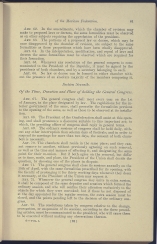
Of the Time, Duration and Place of holding the General Congress.
Article 67. The general congress shall meet every year on the 1st of January, in the place designated by law. The regulations for the interior government of the same, shall prescribe the formalities previous to the opening of the same, as well as those to be observed at its installation.
Article 68. The President of the Confederation shall assist at this opening, and shall pronounce a discourse suitable to this important act; to which, the presiding officer of the congress shall reply in general terms.
Article 69. The ordinary sessions of congress shall beheld daily, without any other interruption than solemn days of festivals; and in order to suspend its meetings for more than two days, the consent of both chambers is necessary.
Article 70. The chambers shall reside in the same place; and they cannot remove to another, without previously agreeing on such removal, as well as the time and manner of effecting it, and designating the same point for their reunion. But if both agree on the removal, but differ as to time, mode and place, the President of the States shall decide the question, by choosing one of the places in dispute.
Article 71. The general congress shall close its sessions annually on the 15th of April, with the same formalities prescribed for its opening, with the faculty of prolonging it for thirty working days whenever they deem it necessary, or the President of the Federation may request it.
Article 72. Whenever the general congress may unite in extra session, it shall be composed of the same deputies and senators which formed the ordinary session, and who will confine their attention exclusively to the objects for which they were convoked; but if these be not disposed of at the day appointed for the regular session, the extra session must be closed, and the points pending left to the decision of the ordinary congress.
Article 73. The resolutions taken by congress relative to the change, prorogation, or suspension of its sessions, according to the three preceding articles, must be communicated to the president, who will cause them to be executed without making any observations thereon.
(Transcription, errors in original preserved)

